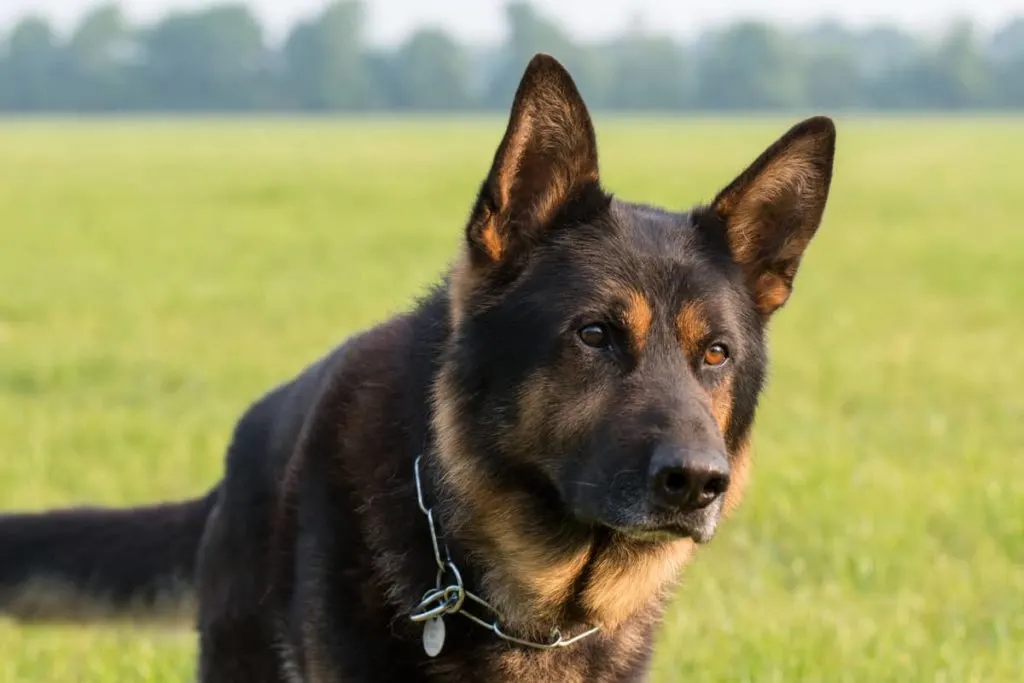
One of the most common dog breeds used in the police force is the German Shepherd. They’re loyal, smart, and hardy dogs that love to please their humans.
They’re also strong, tough, and intimidating in looks and behavior. Because of their combat service background, GSDs tend to be viewed as an inherently violent breed, which can make people worried about safety around their family.
The biggest question is: Can a German Shepherd kill you?
Yes, a German Shepherd can kill you. But, to be fair, almost any dog can kill you. Yet, that doesn’t mean they’re just waiting for the chance to do so. While full-on dog attacks aren’t all that common, it’s a good idea to know what to look for and the correct way to deal with one if it does happen.
In this article, we’ll explore why a GSD may attack, what the warning signs might be, how to protect yourself, and much more.
Click Here to Jump to a Section
Are GSDs Dangerous?
This can be a loaded question with a variable answer. German Shepherds are powerful dogs with the strength to hurt other creatures or humans. But that doesn’t mean they will go out of their way to do so.
There are many factors that contribute to an individual GSD’s predisposition toward violence as opposed to cuddles.
Background Matters
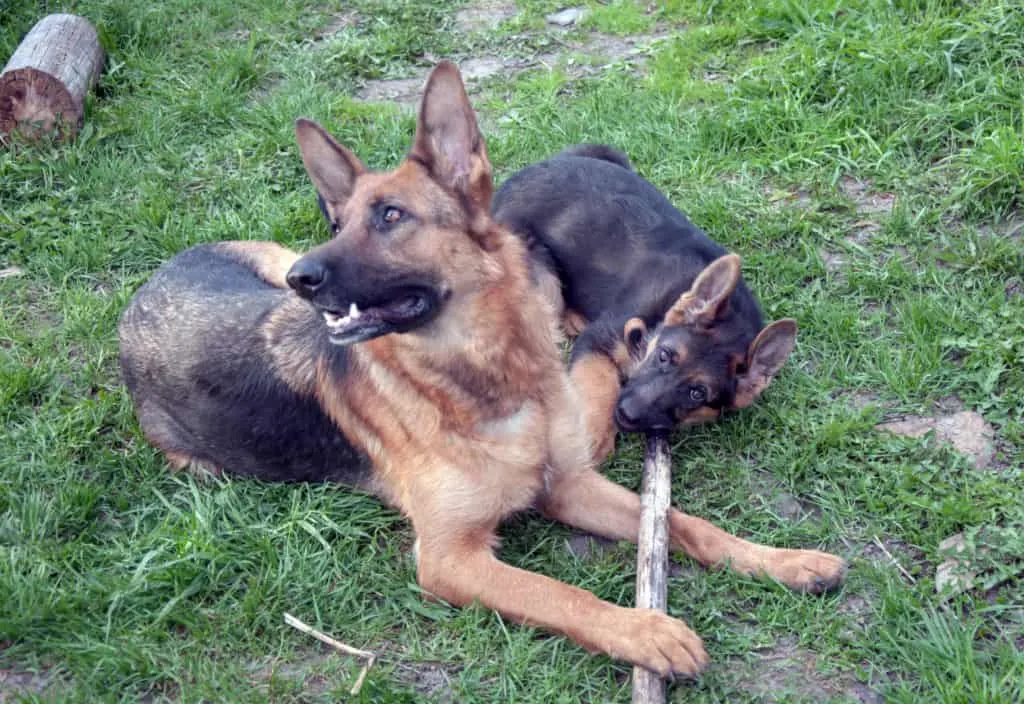
As with all kinds of dogs, the most important thing to keep in mind is that how a dog was raised as a puppy will influence how they behave in their adult life.
So, if a dog was trained properly and raised in a loving home, they are much more likely to end up being a delightful, gentle companion.
However, if a dog grew up in a less than ideal situation and went without proper training, their behavior will reflect it. That could even mean aggression toward people.
It is imperative that all GSD puppies are properly socialized and given appropriate training right from the start.
Bloodlines and Health
Reputable GSD breeders will look for specific desirable traits to pass on to future generations.
While the breed needs to have a certain level of aggressive capability, it’s important that the breeders also make sure loyalty and trainability are included in the line. Too much aggression in a bloodline can invite disaster.
Health issues can also impact how a German Shepherd behaves. A usually sweet and loving GSD can turn sour and aggressive when they’re in pain or not feeling well.
Can a GSD Hurt a Person?
German Shepherds are large dogs with a strong build, and they were bred for herding and protecting livestock. That means that if this kind of dog wanted to harm someone, they could.
Thankfully, most GSDs have no desire to harm their human companions.
However, combine bad breeding or failing health with a lack of appropriate training in a German Shepherd, and you have a potentially volatile situation. A poorly-trained or sick GSD can hurt a person, but this can be avoided.
We can’t stress this enough: good training early on is the best way to prevent a German Shepherd from developing aggressive tendencies.
Could a German Shepherd Mortally Wound Someone?
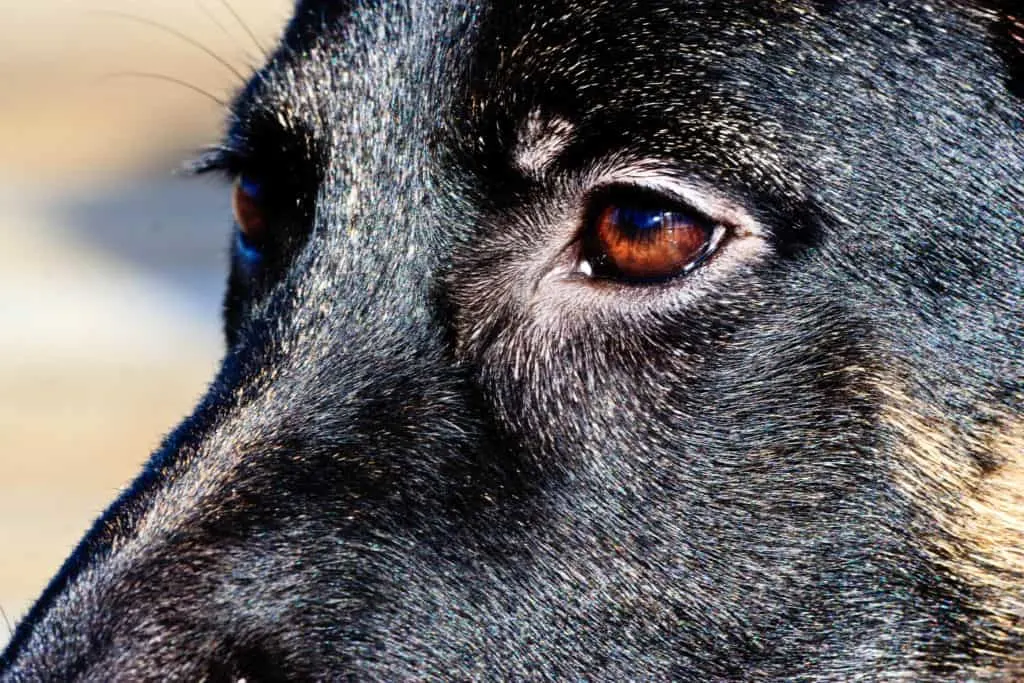
As much as I’d love to say no, the fact is that since German Shepherds were originally bred as herding dogs to protect livestock from predators, they could inflict some pretty serious damage given the right situation.
And by “right”, I mean the worst-case scenario. The GSD has a powerful jaw, sharp teeth, and strong muscles, all aspects capable of mortally wounding a human being.
Does this make all German Shepherds dangerous? No, not at all! One ill-tempered German Shepherd shouldn’t make the rest look bad.
Are German Shepherds more violent than other breeds? Same answer: just because a handful of GSDs weren’t trained right or grew up in a bad situation doesn’t make the rest dangerous or more violent.
Given a shady enough background, any breed of dog could be dangerous. Just because German Shepherds got a bad reputation years ago doesn’t actually make the entire breed bad.
However, due to their size and muscular builds, they can obviously be deadlier than, say, a tiny Pomeranian out for blood.
Understanding the potential for aggression or danger in an animal isn’t the same as expecting that animal to be violent or dangerous.
What to Do If a GSD Attacks You
Even though it’s unlikely you’d even be attacked by a well-trained German Shepherd, it’s still smart to get yourself armed with knowledge.
If you find yourself at the bad end of an angry GSD who’s barreling toward you with obvious ill intent, what do you do?
First of all, don’t panic. I know, the thought of any dog trying to attack you is scary enough, but when a dog who’s been specifically bred for protection and intimidation comes at you, you may have the knee-jerk reaction to run or fight back.
I can assure you, this is the absolute worst thing to do. I wholeheartedly hope that you don’t try to outrun or fight a charging German Shepherd.
Instead, watch for the warning signs, take appropriate action, and get yourself to safety as soon as possible. Here’s how.
How Can You Tell When a GSD Is About to Attack?
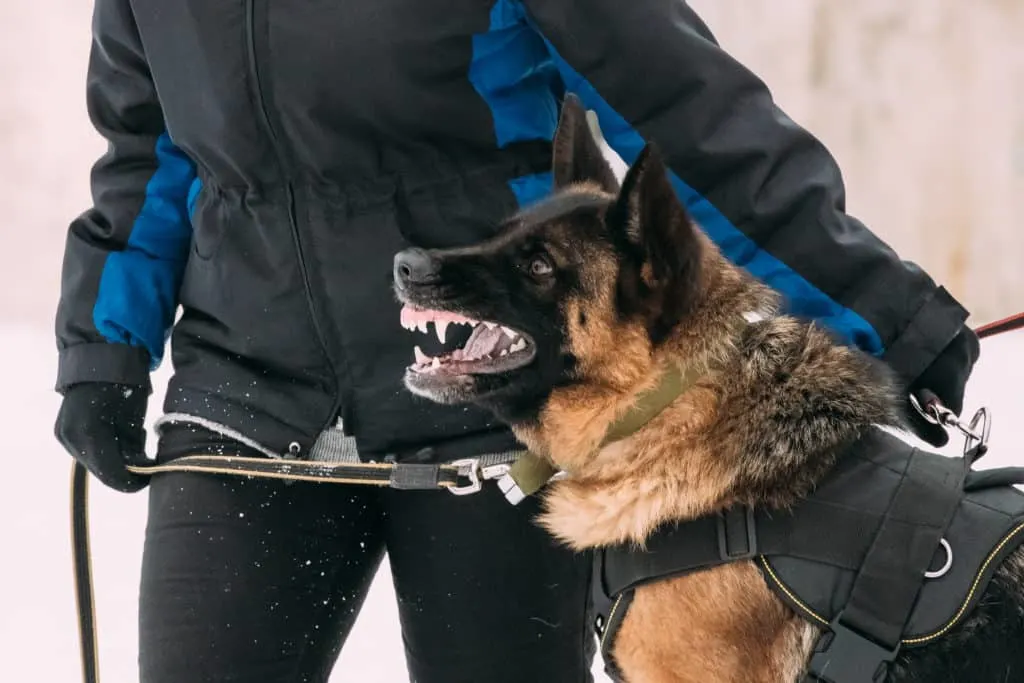
Aside from the obvious signs like snarling, gnashing their teeth, and lunging at you, how else can you tell when a GSD might attack?
Dogs can have some pretty subtle and easily missed body signals that they use to communicate how they feel. Learn to spot these signs and you might just avoid the confrontation altogether.
Unfortunately, there isn’t always a surefire way to tell when a GSD might become aggressive because every dog is different, but for the most part, a GSD might:
- The dog will freeze. Their body will go stiff and statuesque. They will look alert and unflappable at this point, ready to charge.
- The tail will be low to the ground. No wagging and no playful curl, just a sunken and motionless tail.
- The eyes will go wide, possibly even showing the whites.
- Both of the ears will go back. They likely will hold the ears flat, unmoving instead of twitching and listening for sounds all around them.
- The fur on the back of the neck and along the spine will bristle and stand on end. This may make the dog appear much bigger.
- The head may sink a bit, but not all dogs do this.
- The dog may begin to growl or bark, but not all German Shepherd will vocalize before they attack.
What to Do When a GSD Becomes Aggressive
Don’t look the dog in the eyes. For canines, staring into their eyes is seen as an aggressive act. This is another piece of subtle body language that you should be aware of to help avoid any misunderstandings.
If you stare into an angry German Shepherd’s eyes, they may take it as a challenge. By avoiding eye contact you’re telling the dog you’re not interested in fighting.
As you avoid eye contact, slowly turn your body to the side. If the dog has any intention of lunging, you don’t want the squishiest parts of you to take the brunt of the attack.
Turning your side to the dog will put your tougher outer thigh, leg, and torso in their line of sight instead of your stomach or groin.
At this point, assuming the dog isn’t actively lunging at you, ignore the dog entirely. If you ignore the dog, you become a boring and non-threatening target, and the dog may lose interest.
Keep your limbs close to your body at all times. German Shepherds are known to aim high and grab limbs. If your arms are crossed and inaccessible, they may think twice about attacking, or at least limit the damage you might take.
Slowly maneuver yourself away from the dog. Sometimes, a dog might become aggressive because they’re guarding something. This could be a place, an object, or even another person.
By removing yourself from the vicinity of the dog and whatever they may be guarding, the dog may lose interest and choose not to pursue.
What to Do When an Unleashed GSD Comes for You
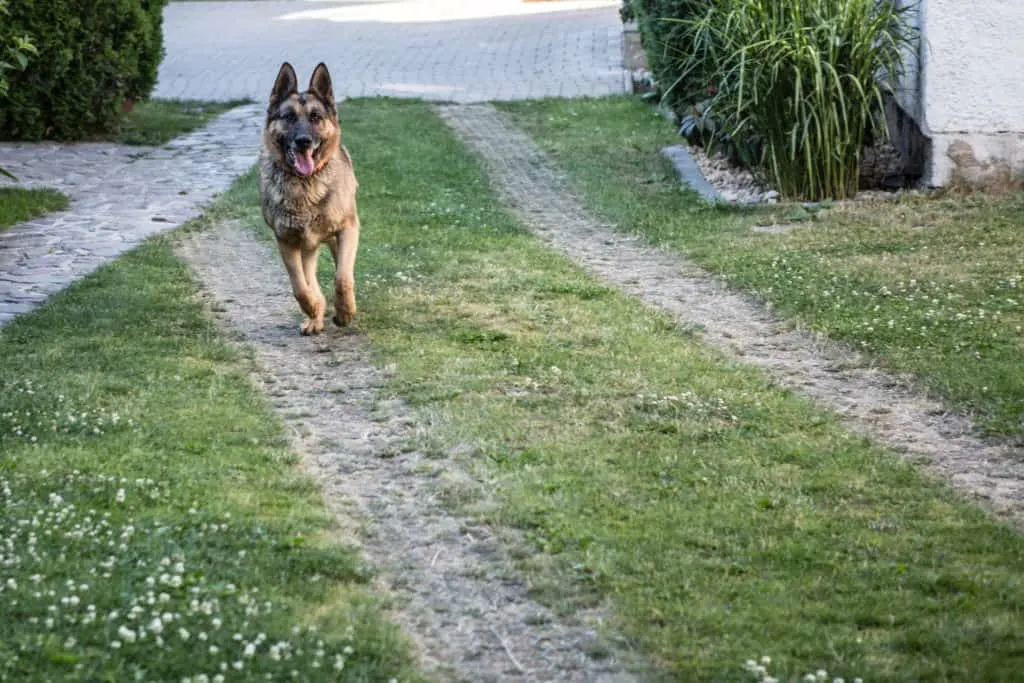
For the most part, an unleashed dog running toward you barking and snarling isn’t usually going in with the intent to bite you. More likely, the dog is just trying to tell you to leave the area.
But if you start to flail and run away, the dog’s hunting instincts will kick in and they will give chase.
Sometimes, though, even if you don’t freak out and you try to avoid the interaction with the tips above, the dog may attack anyway.
If none of those tips work and the dog still decides you’re worth the chase, you’re not powerless. This is where your big human brain will come in handy.
Stay Calm
Once again, stay calm. A vicious dog might be scary, but panicking will definitely make the situation much worse. Dogs can sense your emotions and your body’s response to stress.
The more stressed or freaked out you become, the more agitated the dog will become. Slow, smooth, fluid movements are key.
Don’t Run
Don’t run, as tempting as it may be. While for the most part moving quickly away from the danger would serve you well, any fast movement will just further aggravate the dog and provoke it to attack you.
Move slowly and with purpose, keeping an eye on the dog and another eye on your escape route.
Stay Quiet
Don’t yell, scream, or make loud noises. Yelling and screaming, while it might alert another person to your location, will also aggravate the dog further.
You’ll just appear to the dog as another squeaky toy, and trust me, you don’t want that.
Barriers
Try to slowly move behind something sturdy. While you don’t want to casually saunter away with an angry GSD snapping at your heels, you don’t want to run at full speed either.
Go at a steady pace toward something sturdy, such as a wall, small building, a car, or even a picnic table or trash can. Just get something between you and the dog.
Shielding
If you don’t have anything sturdy to block yourself with, you can use a flat object to make a barrier between you and the dog. This could be a board, a briefcase, or a large book if that’s all you have.
German Shepherds like to grab and hold onto things, but if the surface is hard and flat enough, they will give up on grabbing it.
Make sure the object is close to you and not extended out toward the dog. If the object is protruding, the dog might be able to squeeze around or under it and get to you.
If you don’t have any flat object to act as a wall between you and the dog, then any object can be used to direct the dog’s jaws toward.
A purse, backpack, or shopping bags can all work, though they’re not ideal. It doesn’t matter what it is, anything is better than those jaws grabbing onto you.
What to Do If a German Shepherd Knocks You Down
If the dog has knocked you on the ground, it could be terrifying. Don’t flail; that will only get your arms and legs closer to the dog’s mouth.
Instead, curl up in a ball and use your arms to protect your neck and head. Doing this limits the damage the dog can inflict on any vital parts. As long as you stay still and quiet, the dog may lose interest.
Do GSDs Bite Their Owners?
This is a yes and no answer, and it has a lot to do with dog psychology and training.
Dog Psychology
Sometimes a puppy will lightly nip or put their mouth on someone, but not actually draw any blood. This isn’t a vicious bite so much as what’s called “mouthing”, and it’s a normal part of puppyhood.
It happens when they are feeling playful. Usually, a dog’s parents or siblings will teach them not to do that by yipping in response to tell them it hurts or they don’t like it. The puppy thinks, “Oh hey, maybe I shouldn’t do this” and they find other ways to play instead.
Training
Unfortunately, not all GSD parents teach their pups not to mouth or nip. That means it’s your job. Since GSDs have very strong jaws, this mouthing and playful nipping could be painful to humans.
Even if it’s not painful at first, it won’t be long before it is. If they’re not quickly taught that mouthing is not okay, then they can develop a biting problem later on which can lead to serious injury.
Why Might a GSD Bite His Owners?
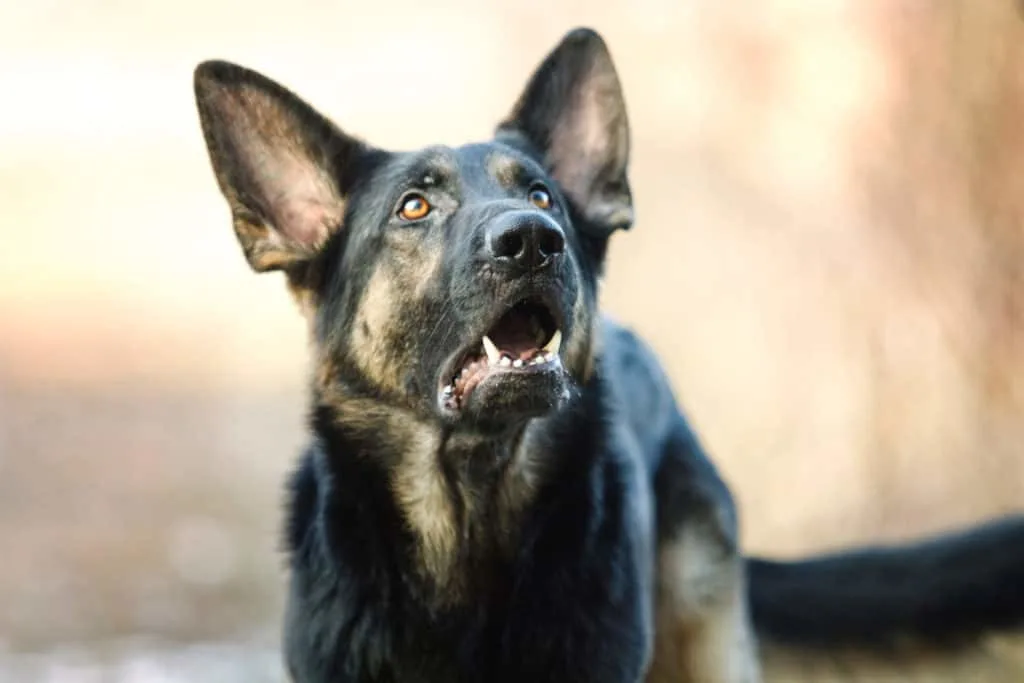
Despite the breed’s history and original purpose as livestock guardians, German Shepherds are actually very affectionate toward people.
They tend to form a strong and unbreakable bond with their owners. As such, they don’t tend to bite their owners.
Jealousy
While they usually avoid biting their human companions, they do have a problem of becoming jealous, which might cause them to snarl or nip at another person or dog that comes near their owner.
Inappropriate Training
Sadly, not all GSDs are raised equally; some German Shepherds are raised in a less than ideal location, with abusive owners who don’t properly train their dog. Some irresponsible owners will even try to train them to be guard dogs and to purposefully bite people, which is never okay.
Unless you’re a professional dog trainer, you should never attempt to teach a dog to guard your house. You should never teach your dog that biting people is okay. GSDs have very powerful jaws and can inflict some pretty serious damage if given the chance.
Uncertain Pasts
As long as you carefully train a German Shepherd puppy from a reputable breeder, you shouldn’t have any biting problems. However, if you decide to adopt a GS that came from an unknown household, you run the risk of the dog not being taught properly.
I’m not saying to never adopt a dog, it’s just that you should keep in mind that you may have your hands full with teaching them that biting is a no-no.
Boredom
GSD are very active and require a lot of play and exercise time. A frustrated or bored German Shepherd may turn to biting as a way to get attention or to release some pent-up energy.
So long as you’ve properly trained your GSD that biting is not acceptable at any time, that it’s okay for you to pet other animals and be near other people, and you’ve given them enough exercise, you should have the recipe for a happy dog.
What to Do If Your GSD Has a History of Biting
If you’ve come to this article after your German Shepherd has already started biting people, it’s still not too late.
Before you whip out the choke or shock collars, or even give up entirely, what if I told you there may be a way to teach even the most stubborn GSD not to bite people without turning to the extreme?
Age Matters, but Only a Little
Typically, the younger the dog, the easier it is going to be to train them. Yet, that doesn’t necessarily mean that older dogs are a lost cause. Older dogs might be harder to train away old habits, but it’s not impossible and should definitely still be tried.
Positive Reinforcement
Dogs tend to learn better with positive reinforcement and treats rather than punishment and negative outcomes. Dogs also like repetition, so repeating the same commands with the same time between you giving the dog a treat and praise after a successful act is crucial.
Never Strike or Yell
You should never discipline a misbehaving dog with violence. The saying “violence begets violence” applies very strongly in this case. By hitting your dog, they may decide that you should get a taste of your own medicine.
The same applies to yelling or scolding harshly. This may make your dog fearful, in which case they’d continue to bite out of fear for their safety.
Get Help
Through proper and rigorous training, almost any dog can overcome their tendency toward biting. But it isn’t always possible all alone. If you’re dealing with a particularly stubborn GS, then you should seek professional help for specialty training.
Is Putting Down a Violent GSD the Right Thing to Do?
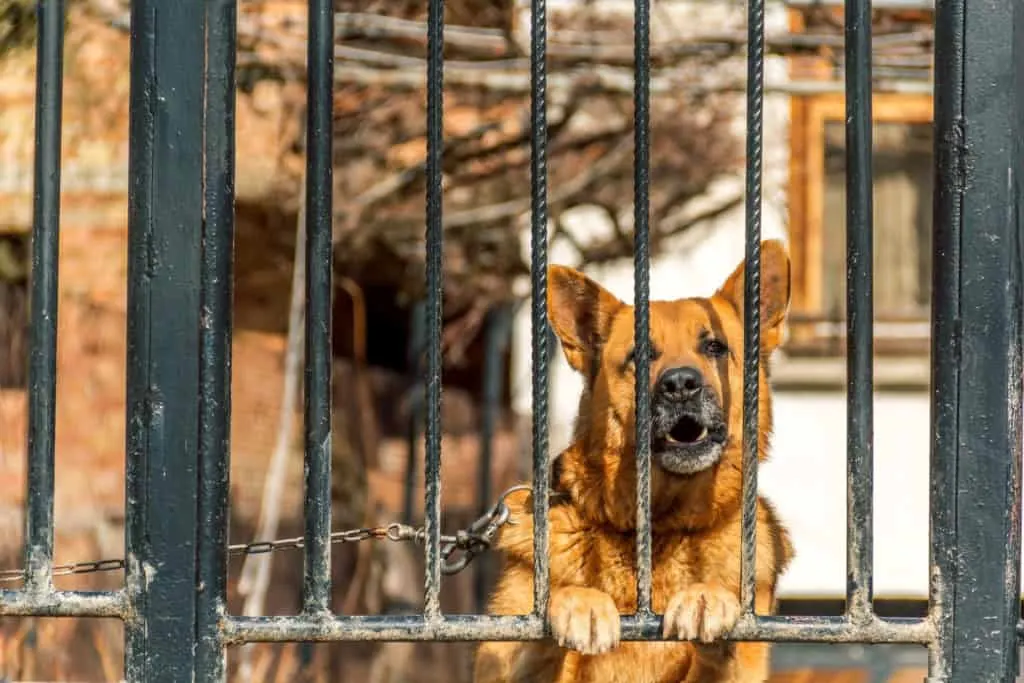
Sometimes, when an owner has a violent GSD and doesn’t think they can train it themselves, they may think of putting their dog down. This isn’t always the right move, however.
Even if it may seem hopeless right now, you should always be sure to exhaust every other option before you even consider putting a dog down.
Why? While putting down a dog will always solve the problem right away, you’ll also be ending the dog’s life without knowing whether you could improve the dog’s life instead. Once the dog is dead, there’s no turning back.
Now, I’m not saying there’s never a proper time to consider putting a GSD down, but if there’s really nothing wrong with the dog physically or mentally, perhaps all the poor dog needs are some compassion and specialty training. Don’t give up too soon!
Final Thoughts
Even though dog attacks don’t happen often, there’s still no harm in arming yourself with the knowledge of the correct way to deal with an aggressive German Shepherd.
Hopefully, this article has given you some insight on how to deal with an aggressive GSD and what their warning signs could be. After all, it’s so much better to avoid the situation than try to find a way out of it.
